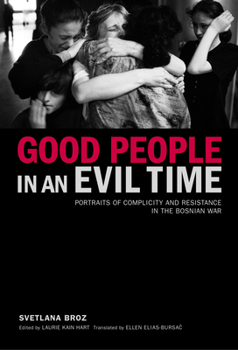Good People in an Evil Time: Portraits of Complicity and Resistance in the Bosnian War
Select Format
Select Condition 
Book Overview
In the 1990s Svetlana Broz, granddaughter of former Yugoslav head of state Marshal Tito, volunteered her services as a physician in war-torn Bosnia. She discovered that her patients were not only in need of medical care, but that they urgently had a story to tell, a story suppressed by nationalist politicians and the mainstream media. What Broz heard compelled her to devote herself over the next several years to the collection of firsthand testimonies from the war. These testimonies show that ordinary people can and do resist the murderous ideology of genocide even under the most terrible historical circumstances. We are introduced to Mile Plakalovic, a magnificent humanist, who drove his taxi through the streets of Sarajevo, picking the wounded up off the sidewalk and delivering food and clothing to young and old, even when the bombing was at its worst. We meet Velimir Milosevic, poet, who traveled with an actor and entertained children as they hid in basements to avoid the bombing and gunfire, and we hear the stories of countless others who put themselves in grave danger to help others, regardless of ethnic background. Faced with a world in which unspeakable crimes not only went unpunished but were rewarded with glory, profit, and power, the Bosnians of all faiths who testify in this book were starkly confronted with the limits and possibilities of their own ethical choices. Here, in their own words they describe how people helped one another across ethnic lines and refused the myths promoted by the engineers of genocide. This book refutes the stereotype of inevitable natural enmities in the Balkans and reveals the responsibility of individual actions and political manipulations for the genocide; it is a searing portrait of the experience of war as well as a provocative study of the possibilities of resistance and solidarity. The testimonies reverberate far beyond the frontiers of the former Yugoslavia. This compelling book is essential reading for anyone who wants to understand the reality on the ground of the ethnic conflicts of the late twentieth and the twenty-first centuries.
Format:Paperback
Language:English
ISBN:1590511964
ISBN13:9781590511961
Release Date:January 2005
Publisher:Other Press (NY)
Length:584 Pages
Weight:2.05 lbs.
Dimensions:1.3" x 5.9" x 9.1"
Customer Reviews
2 ratings
Great book about smal people..
Published by Thriftbooks.com User , 19 years ago
Agression on Bosnia 1992-1995. This book is giving extraordinary testimonies about small everyday people who helped others, cherishing compassion and human kindness, even many times putting them-self in deadly situations, crossing the lines of ethnic divisions, religions or political opinion. All stories are proof that human goodness must prevail over human darkness, that human being alone and small as it look,can make huge difference in our world. Bosnian story can happen anywhere, so it is highly recomended in todays world, where more compassion is needed in our every day life. Thank you Svetlana for your great work.
Outstanding book
Published by Thriftbooks.com User , 20 years ago
Bottom line, this is a great book. The introduction alone, by editor Laurie Kain Hart, is absolutely extraordinary, and the author's own preface is exceptional. But the text, and the heart, of "Good People in an Evil Time" is simple accounts by ordinary Bosnian people of their experiences during the war. Many other books have addressed political, military, and historical aspects of that war, but frankly few of them seem to help in understanding the human side and the present day. For those who did not experience the war first hand, answers to the human questions have been very slow in coming, but this book has them by the dozens in the voices of ordinary people. For the creation of this book Broz was exceptional in several ways. She is a granddaughter of Josip Broz, commonly known as Marshal Tito, Yugoslavian hero of World War II and head of state of the communist post-war Yugoslavia. Her family name carried respect that undoubtedly gave her entree to pass many gates that would have closed to others and provided a foundation for trust. Her status as a doctor gave her standing to request entry to combat zones to try to help those who were suffering, and her personal qualities brought her to act where most others would not. In Broz's own words, "Treating people of all three religious traditions, I felt their need to open their souls and tell me, shyly at first, what had happened to them during the war. From these brief stories on cardiology wards, I realized how thirsty people were for a truth that was subtle and nuanced where the shells were falling, in a way that it wasn't in Belgrade or in the worldwide black-and-white coverage." A great achievement of this book is to show so clearly how people are more than their membership in an ethnic group. Hopefully, it will also remind us to look beyond caricatures of ethnic groups in conflict and to search for victimizers and power seekers who hide themselves or profit by casting blame everywhere but on themselves. For the Bosnians and those near to them, this book also helps to confirm that goodness among them was not isolated, to remember and honor some of those who practiced it. My wife and her family came to America from Bosnia as refugees during the war, and many members of their extended family still live in different parts of Bosnia. While without doubt there are bigots, villains and crooks as well as decent people in the former Yugoslavia, the voices in this book echo the many experiences and first-hand accounts of the mutual understanding and simple unconcern over ethnic differences among ordinary people of the region.





